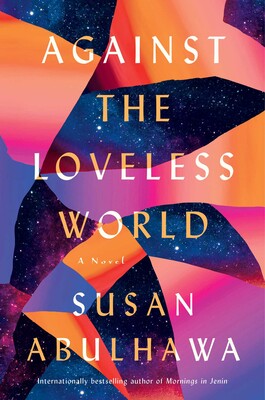
A vault door on the south side is the only entrance and exit. Food comes through a waist-high rectangular opening. Sometimes books are pushed through the same slot.
The first books I received preceded the first visitors by a few days. One was about blue whales, one on the cosmos, and another a bad translation of a badly written Western romance novel. I devoured them before the visitors arrived and had begun rereading about blue whales. Such extraordinary creatures. True gentle giants, full of mystery and romance, like the ocean itself.
An expressionless armed guard escorted the visitors into the Cube—a woman in her mid-twenties and a man twice her age. He spoke Arabic. She didn’t, but was learning, she said. They asked short, simple questions. What did I eat? How frequently? How often did I go outside? Did I communicate with family? Did they give me books to read? Pen and paper?
I find it difficult to look visitors in the eyes. My gaze gravitated to the man’s dark, hairy forearm emerging from a rolled-up white sleeve.
All I could think about was touching the dark, hairy forearm.
“Are you interested in blue whales?” the woman asked, nodding at my books. “And outer space?” She smiled as if we were having a normal conversation. I understood her English, but I waited for the man to translate. Information swirled in my head. Blue whales are the largest creatures ever to roam our planet, as long as thirty meters and weighing up to 173,000 kilograms. They have intricate social lives and complex languages. Hunted to near extinction. Less than a few thousand remained before whaling restrictions were introduced, but whalers continue to serve a black market, and these majestic creatures might disappear from the world. Blue whales subsist on krill. Krill is a Norwegian word. I wonder what it’s like to be Norwegian. What’s it like to be a whale? To live in water. To be the biggest creature on earth, still vulnerable to a small man’s greed.
Dark, hairy forearm. Rolled-up white sleeves.
“Yes,” I said, barely audible. “I’m interested in whales.” Her gaze made me more aware of my prison clothes. I had done my best to tidy my hair. Although the man was dressed casually, the woman wore a conservative dark suit, low black heels, and a gray blouse. Blue stones studding her ears accented her blue eyes and, when I focused on them, it seemed as if she had four blue eyes. I wished she had worn glasses. I’d like to see a reflection of myself.
All I could think about was touching the dark, hairy forearm.“You seem healthy and well-groomed. I understand your shower comes on automatically. Are you able to shower daily?”
The man did not translate, nor did he realize that I understood her speaking to me as if I were a child. But I wanted him to translate so I could ask her about her hygiene habits too.
“Yaqoot, is there anything else you would like to talk about or bring to our attention? We have ten minutes left,” the man said.
“Have you spoken with my family?” If they had, it would have been the first thing they told me. If they had any decency.
The man lowered his eyes. She looked at him, then at me. “No. We didn’t,” he said. “But we will, and I’ll let your mother know you’re fine.”
Fine?
I put my feet up on my bed and turned my back to them.
Shortly after they left, the same hard-faced guard came in to retrieve the books. I had locked my bracelets facing the room this time, because I wanted to get a last glimpse of the blue whales, the stars and planets and cheap romance before they were taken from me forever.
“Otva`li, mu`dak, b`lyad!” I yelled, bound to the wall by my bracelets.
We were both shocked: me, because she understood.
She turned to me, her hard face replaced with a smile. I smiled too, and said it again. Fuck off, you asshole, fuck!
She laughed, and so did I. She put her hand on her chest and said, “Klara,” nodding as she walked out, the metal door closing with an automated clang.
The next day, my whale book was pushed through the door opening.
That’s how Klara became my friend, or what could pass for a friend in the Cube. She speaks to me sometimes through the speaker, since the camera doesn’t record sound, and even though I don’t fully understand what she says. She would be reprimanded if they knew. She told me that. I keep my mouth shut because I like her. Sometimes I remember that I should not like her. But I am always excited when she is on duty. She doesn’t consider herself Israeli. She’s Russian. Her family forced her to leave with them, and she desperately wants to return to her village. She’s not even Jewish. She said her father made it all up to get the state subsidies for Jews willing to immigrate to Israel. It was free money, plus her father was close to being caught for embezzling. She hated her father. And she missed her boyfriend. She apologized for not getting more books. I should add that the things she tells me are my interpretations of the broken English, Arabic, and Hebrew we use to communicate. I asked if I could get books about communism. She said, “Da, naverna.” Yeah, probably.
I fell asleep thinking about the dark, hairy forearm below a rolled-up white sleeve. It reminded me of meeting Bilal, when I returned to Palestine seeking a divorce.
__________________________________
Excerpted from Against the Loveless World by Susan Abulhawa. Copyright © 2020. Reprinted with permission of the publisher, Atria Books.


